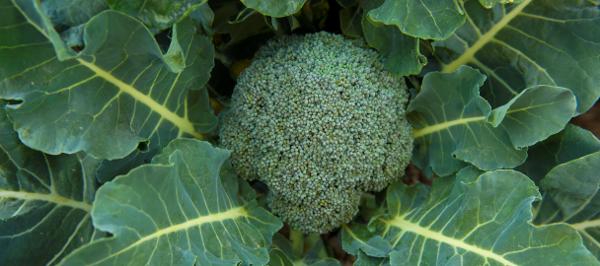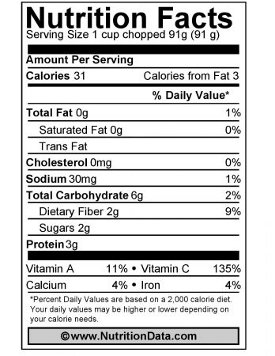Contents:
Common Names | Parts Usually Used | Plant(s) & Culture | Where Found | Medicinal Properties | Biochemical Information
Legends, Myths and Stories | Uses | Formulas or Dosages | Nutrient Content | How Sold | Warning | Resource Links
Scientific Names
- Brassica oleracea
- Brassicaceae family
Common Names
- Brócoli
- Broccoli Flower
- Calabrese Broccoli
- Purple Sprouting Broccoli
Parts Usually Used
The parts that grow above the ground
Back to Top
Description of Plant(s) and Culture

Broccoli has large flower heads, usually dark green in color, arranged in a tree-like structure branching out from a thick stalk which is usually light green. The mass of flower heads is surrounded by leaves. Broccoli resembles cauliflower, which is a different cultivar group of the same Brassica species.
Back to Top
Where Found
Broccoli is cultivated as a vegetable worldwide.
Back to Top
Medicinal Properties
Scientific research has shown support for broccoli having cancer fighting properites, bone health improvement abilities and anti-aging properties. It has also shown promise as a treatment for fibromyalgia, high blood pressure, asthma, allergic rhinitis, chronic obstructive pulmonary disease (COPD), schizophrenia, age-related macular degeneration (AMD), type 2 diabetes, Crohn’s Disease, leaky gut and colitis. Borccoli is also known for its ability to improve digestion, natural detoxification, immune boosting, cholesterol-lowering and anti-inflammatory effects.
Back to Top
Biochemical Information
Broccoli contains antioxidant phenolics, such as 5 and kaempferol 3-O-sophoroside, 1-sinapoyl-2-feruloylgentiobiose, 1,2-diferuloylgentiobiose, trisinapoylgentiobiose, and neochlorogenic acid.
Back to Top
Legends, Myths and Stories
The word broccoli comes from the Italian plural of broccolo, which means “the flowering crest of a cabbage”, and is the diminutive form of brocco, meaning “small nail” or “sprout”.
Back to Top
Uses
 Broccoli is eaten as a vegetable and is used as an ingredient in a multitude of diets and cuisines.
Broccoli is eaten as a vegetable and is used as an ingredient in a multitude of diets and cuisines.
Cruciferous vegetables, such as broccoli have shown cancer fighting properties against lung, colon, rectal, prostate, breast, bladder and stomach cancer. In fact, broccoli has been shown to kill the stem cells that make cancer immortal.
Adding broccoli to the diet has shown a link to a lower risk of bone fractures due to its vitamin K.
Eating more broccoli has shown the ability to help fight sun damage to the skin as well as a protection against polution.
The high fiber content of broccoli helps digestion, helps prevent constipation and is a natural detoxifier.
Broccoli has been shown to significantly lower risks of developing coronary heart disease, stroke, hypertension, diabetes, obesity, and certain gastrointestinal diseases.
A new study titledby the Buck Institute for Research on Aging in Novato, Californiashows that broccoli increased 10-fold the strength of a compound found in broccoli to develop a possible treatment for age-related macular degeneration (AMD).
Johns Hopkins Medicine researchers say a compound derived from broccoli sprouts can help adjust the chemical imbalances in the brain that have been linked to schizophrenia. The vegetable’s high levels of the chemical sulforaphane could potentially be used as an alternative to antipsychotic drugs and their often painful or dangerous side effects.
Formulas or Dosages
High cholesterol. Drinking a beverage containing broccoli, cabbage, and fruit twice daily for 12 weeks seems to reduce “bad” low-density lipoprotein (LDL) cholesterol in people with high cholesterol.
Early research suggests that taking ascorbigen and broccoli powder by mouth might reduce pain and other symptoms in people with fibromyalgia.
A University of Illinois study suggests that combining broccoli with broccoli sprouts may make the vegetable’s anti-cancer effect almost twice as powerful.professional before using. Broccoli sprouts should be eaten raw. They are great on sandwiches, in wraps, or as a salad topping.
Back to Top
Nutrient Content
Broccoli is a rich source of vitamin C and vitamin K, several B vitamins and manganese.

How Sold
Sold in grocery stores as a fresh or frozen vegetable
Back to Top
Warning
People taking blood-thinners, such as Coumadin (warfarin), should use caution when deciding how much broccoli to include in their diet. Broccoli contains vitamin K, which plays a large role in blood clotting.
It is the total diet or overall eating pattern that is most important in disease prevention and achieving good health. The key to a healthful diet is to eat a variety of foods, rather than to concentrate on individual foods.
When applied to the skin, broccoli can cause an allergic rash in hypersensitive people.
People taking these medications that are changed by the liver should be careful not to overdo broccoli in their diet due to potential interactions: clozapine (Clozaril), cyclobenzaprine (Flexeril), fluvoxamine (Luvox), haloperidol (Haldol), imipramine (Tofranil), mexiletine (Mexitil), olanzapine (Zyprexa), pentazocine (Talwin), propranolol (Inderal), tacrine (Cognex), theophylline, zileuton (Zyflo), zolmitriptan (Zomig), nicotine, chlormethiazole (Heminevrin), coumarin, methoxyflurane (Penthrox), halothane (Fluothane), valproic acid (Depacon), disulfiram (Antabuse).
Back to Top
Resource Links
Broccoli’s Cancer-Fighting Potential Revealed
Futurity: Broccoli Sprout Extract May Block Cancer’s Return
University of Pittsburgh: Broccoli Sprout Extract May Protect Against Oral Cancer Recurrence
Prevention of Carcinogen-Induced Oral Cancer by Sulforaphane
Futurity: Stuff in Broccoli Helps Drug Kill Colon Cancer
Broccoli ingredient has positive influence on drug efficacy
Futurity: Drug Made from Herbs May Fight Breast Cancer
Futurity: Broccoli Sprout Extract May Prevent Mouth Cancer
Futurity: This Broccoli Compound May Treat Prostate Cancer
SUV39H1/H3K9me3 attenuates sulforaphane-induced apoptotic signaling in PC3 prostate cancer cells
Futurity: How Selenium in Broccoli May Fight Melanoma
University of Copenhagen: Selenium compounds boost immune system to fight against cancer
Broccoli Sprout Extract May Improve Autism Symptoms
MedicalNewsToday: The many health benefits of broccoli
Want a healthy gut? Eat more broccoli, study says
How to Get More Cancer Protection From Your Broccoli
Eating Kale and Broccoli Can Help Prevent Colon Cancer, Study Claims
Health benefits and possible risks of broccoli – An overview
Broccoli can deliver therapeutic benefits, study says
ClinicalTrials.gov: Broccoli In Osteoarthritis (BRIO)
National Cancer Institute: Cruciferous Vegetables and Cancer Prevention
Broccoli may help fight off schizophrenia: study
Broccoli sprout compound may restore brain chemistry imbalance linked to schizophrenia
Antioxidants and Fiber May Aid Blood Sugar Control
High-throughput sequencing in medicinal plant transcriptome studies
ScienceDirect:: Nutraceuticals in Cardiovascular Diseases
ScienceDirect: Dietary Influence on Pain via the Immune System
ScienceDirect: Fruit and Vegetable-Based Beverages—Nutritional Properties and Health Benefits
Potential health benefits of broccoli- a chemico-biological overview
